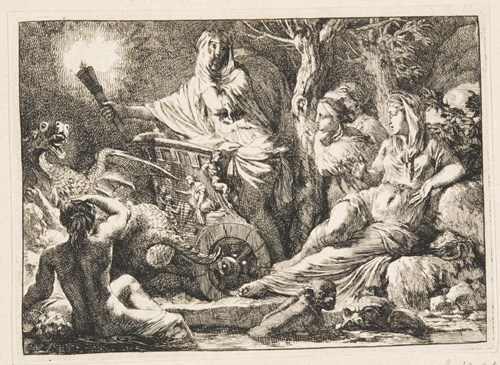The Lesser Mysteries ceremony
The Lesser Mysteries were dedicated to Persephone and Dionysus, but the celebration's program remains a mystery. It was held for three days (from the 19th to the 21st of the Anthesterion) and was accompanied by the proclamation of a holy truce for a period before and after the celebration. Sacrifices were performed in honour of Demeter and Persephone and purifications in the river Ilissos to morally cleanse the prospective initiates and provide specific instructions to prepare for the initiation into the Greater Mysteries properly. The mystagogos was in charge of the purification in remembrance of the purification of Heracles by Demeter.
The festival included dances, songs, fasting and dramatic representations of Persephone's abduction and Demeter’s wandering searching for her daughter. An additional element, which was absent from the Greater Mysteries, concerned the god Dionysus and a part of his story that was not known to the uninitiated but would help the faithful better understand what would be revealed later in the Eleusis Telesterion. Unfortunately, we do not have more details about this aspect of the ceremony, but it may have been about the death and rebirth of the god.

Ceres Seeking Proserpina, Gerard de Lairesse, 1670-1675, engraving, The Philadelphia Museum of Art © The Philadelphia Museum of Art
Participation in the Lesser Mysteries in early spring was a prerequisite for successful initiation into the Greater Mysteries in early autumn. However, it seems that in some cases, the Athenians could show some spiritual and religious flexibility to serve other purposes. Characteristic is the case of the Macedonian general Demetrius I, also called Poliorcetes. He arrived in Athens in the month of Mounichion (April-May) of 302 BCE and asked to be initiated immediately into the Greater Mysteries. The Athenians officially changed the month's name to Anthesterion and organised the Lesser Mysteries for Demetrius to satisfy this absurd demand. Mounichion then became Boedromion, and the Greater Mysteries were performed, in which Demetrius proceeded directly to the highest degree of initiation, the epopteia (a process that generally required two years). The only one who protested (ineffectively) for this mockery of the law and the institutions was the daduch Pythodoros.
Demetrius was determined to become an initiate, but there were also cases of people who participated in the Lesser Mysteries but did not complete their initiation the following autumn. Some were not interested in going further or could not afford it. Some were forced to postpone or cancel their participation by order of the priests of Eleusis, who were responsible for the whole process. For example, the neo-Pythagorean philosopher Apollonius of Tyana (15-98), who came to Athens in the autumn of 51 to be initiated, was not accepted by the hierophant as a suspect for performing magic. Apollonius was not discouraged, however, and predicted that he would be initiated in the future. Four years later, he was received by another hierophant.





